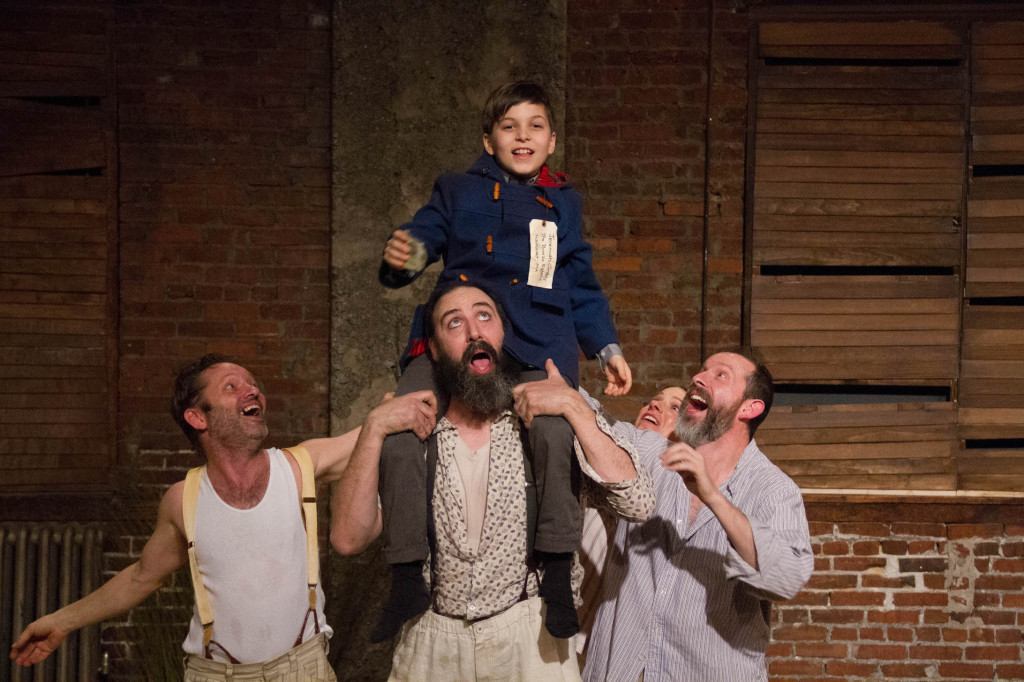Excerpted by kind permission from Neals Paper.

AIPOTU. Mirror-read the title, and you’ll see it spells Utopia. John Guare’s utopia is a lot less pristine, tidy, or effective than Thomas More’s. Or even the neighboring solo outing by Henry David Thoreau, a point made by Lydie Breeze.
Lydie and three fellow survivors from Civll War horrors decide to create an ideal community on her home island of Nantucket. The focal character in a Guare trilogy EgoPo mounts this spring, Lydie makes her Thoreau comparison caustically. She doesn’t point out the fabled Walden Pond denizen is alone and therefore can commune with nature, but that Thoreau has family money and can afford his experiment of eccentricity.
Guare’s trilogy follows Lydie Breeze from the Civil War to the turn of the 20th century, as she strives to remain a survivor in spite of hardship. Lydie proved resourceful as battlefield nurse who takes matter into her own hands in Cold Harbor, Guare’s first entry in his triptych. AIPOTU finds her more at odds with her cohorts — some of them rivals for her sexual attention — and with reality.
As often happens with Guare — who I prefer to trust for his best moments than to dismiss for his muddier or preachier passages — sequences of insight and interesting commentary alternate with dull portions and cant. Director Lane Savadove has been skillful in steering a course that keeps his two “Lydie Breeze” productions so far absorbing enough in the provoking scenes to earn confidence that lets us endure Guare’s labored or less wise bits.
AIPOTU is a prime example of an adventure in Guareland. Its long first act sets up a situation, a good one in which Guare shows in myriad ways why and how Utopias are best left theoretical, even an historic period when they are in vogue, and Lydie and company are sincere about developing one. The problem is the myriad ways, all tied to human nature, fold in on themselves. You have Guare’s point, then he repeats it. Arguments and tensions seem endless, but not in a way that creates suspense or evokes feelings for the characters. This, in spite of excellent acting from Savadove’s nuclear players — Charlie DelMarcelle, David Girard, Ed Swidey, and the evolvingly remarkable Melanie Julian.
The second act is the opposite. Relatively compact at 40 minutes, this ending becomes a fitting and riveting aftermath that suggest that two of the Nirvana-seeking quartet find their Utopias in places least expected, the lucrative practice of law and a prison cell. This second act is the most riveting part of the trilogy to date. Given the competition it had from sequences from Cold Harbor, that is meant to say a lot.
In AIPOTU romantic conflict doesn’t bring us any closer to utopia. DelMarcelle’s Joshua Hickman, and Girard’s Dan Grady, both craving Lydie, now Josh’s wife, and Lydie’s libido leaning in two directions and but listing decided towards the adulterous one, work at much as anything to obliterate common ground (by staking common ground) and create conflict that mitigates the cooperation and consensus required to realize a commune.
Guare illustrates how the best laid plans burst. Reality always encroaches. It encroaches harder when you’re not prepared for it. So Lydie Breeze’s plan of a perfect society is doomed by the constant way of the world. To me, AIPOTU is a warning about why Utopia is ill-fated, period. Read more >>>
[EgoPo Classic Theater at Christ Church Neighborhood House, 20 N. American Street] March 7-18, 2018; egopo.org.
